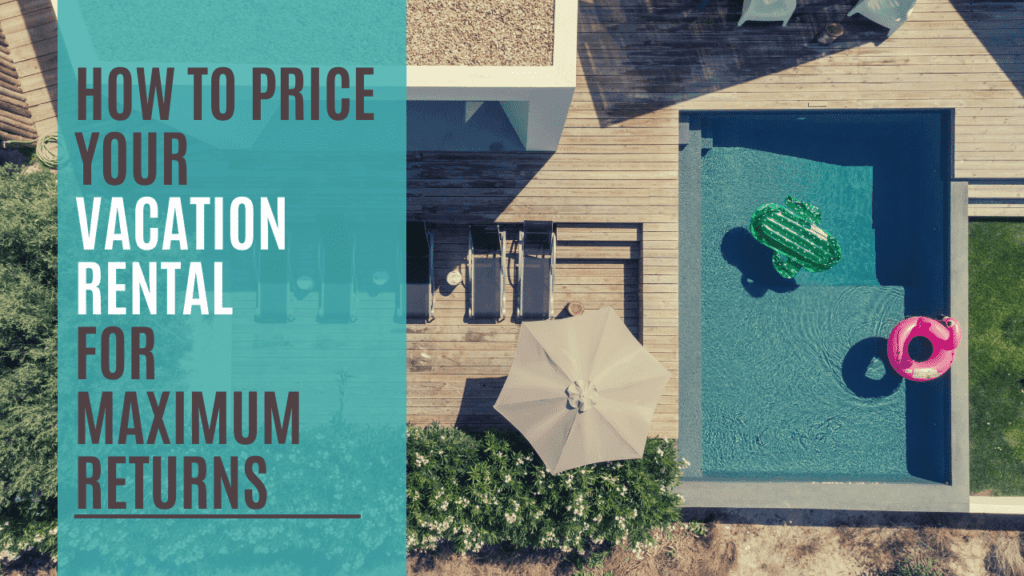
To maximize the returns you earn on your vacation rental property, you need to keep it occupied with guests – even during the slower seasons. Sometimes, a low price will attract those guests to your property. But, you don’t want to underprice your rental property. There are other ways to attract your vacation renters that don’t require you to take a hit on what you earn.
There’s not going to be a single price for your vacation rental, which makes the process even more challenging sometimes. You’ll need to plan ahead and use a pricing strategy that reflects market fluctuations, seasonal demand, and competing properties that might be arriving on the market.
With our experience in vacation rental management, we thought we’d share some tips on how to accurately and profitably price your vacation rental home in Sarasota, Bradenton, or any of the surrounding Gulf Coast cities.
Evaluate Your Costs and Your Competition
Before you can set a price, you’ll need to know what the property costs to own and operate. Balance your income and expenses so you’re making a profit on this vacation investment. As with any rental property, there will be both fixed costs and variable costs.
- Fixed costs are the recurring expenses you can easily plan for. This might be a mortgage payment, landscaping services, pest control, property taxes, and insurance costs.
- Variable costs will change. Examples of a variable expense you’ll try to budget for include maintenance, vacancy, and utilities.
You’ll also need to budget for how you’ll manage larger costs like replacing appliances and furniture, repainting, and emergency roof or air conditioning repairs and replacements.
Always research the competition before you price your own vacation home.
Compare your own home to the others on the market. Are they offering a similar space, or is there something special about what you’re providing? Look at their prices and their occupancy rate. Some of the things that increase a price include:
- Private swimming pool and/or hot tub
- Views of the water
- Extra bedrooms and bathrooms
- Outdoor space
Make sure you’re comparing your own property to those similar to yours. You don’t want to look at hotel rooms or long term rentals. Focus on the vacation homes that are close in size and amenities as well as location. This will give you an accurate idea of where the price range for your property is likely to be.
Price Higher During Peak Seasons
Florida’s Gulf Coast isn’t like other vacation destinations. While there are certainly peak seasons, there’s a year-round demand for vacation housing. Most experts would tell you that the busiest season in Sarasota and Bradenton for vacation rentals would be in the winter – from December through February. But, you’ll also have a lot of demand before and after that. Northerners begin arriving in October for the warm Florida winters, and they’ll typically stay through March and even into April.
Those are your best months for charging the highest possible rents for your vacation property.
That doesn’t mean you’ll be slow in the summer. These months are when the kids are out of school and family vacations bring plenty of local Floridians and nearby neighbors to the beach for a week or two of sun, sand, and surf. You shouldn’t have the highs and lows in terms of vacancy that other vacation destinations might grapple with.
Still, it is always a good idea to study the shifts and trends in the market. This will help you price your property more profitably during the periods of time that your guests will be willing to pay higher rental prices. Does everything in the area tend to book quickly during spring break? That’s a good time to raise your prices. The demand is much higher than during the rest of the year, so the higher prices are supported. .
One of the benefits to short term vacation rentals is that you can charge more on a per-night basis than you would with a long term rental property. So, don’t be put off by an ever-evolving rental rate. You can charge something different the first two weeks of March than you would the last two weeks of August.
Think about holiday weekends, as well. Everyone wants to be at the beach for the three-day weekends that celebrate Memorial Day, Fourth of July, and Labor Day. Your prices should be much higher on those dates than on any random nights in the middle of the week in June.
Get to know the calendar of events in your local area. Prices for your property can go up a bit when there are festivals and events taking place in town. Spring training, for example, is an excellent time to attract baseball fans. They’ll pay a little more to be close to their favorite teams.
Conversely, you may need to drop your rates a bit when things do slow down.
Those back-to-school weeks will likely see fewer people looking for vacation homes, for example. Offer discounted rates when you know it will be a challenge to get any guests in place.
Price with vacancy in mind, too. Even in a high-demand area like ours, it’s hard to achieve perfect occupancy throughout any given year. Track how often your property is generally empty and work that vacancy rate into how you price your property. You’ll want to compensate for it without pricing your property too high.
Offer Discounts for Longer Stays and Repeat Stays
Most vacation property owners adopt a strategy of setting different prices for weekdays and weekends. In the past, most of your vacation travelers would be arriving and departing for a weekend. But, with the shift in the way people are working and the increase in remote work opportunities, you might see guests booking for longer. Remote workers can set up their home office at your vacation rental and stay for a whole month.
How will you price that stay?
You can target this type of traveler by offering weekly and monthly discounts. That will incentivize long term guests to stay for a month or two. It will also prevent a few days of vacancy during that time period. You’ll have fewer cleaning costs and turnover costs when a guest stays for weeks instead of days. It makes sense to offer them a deal.
Providing a discount to repeat guests is also advisable. When your guests choose your property every time they’re in town, you know you’re doing something right. Their reviews are also likely to be positive, which will help you market your vacation home.
Give them a reason to come back. A 10 percent discount or one free night is a great way to keep your guests loyal to you and your property. Let them know you appreciate their ongoing support.
Deals and discounts have always been a reliable way to bring guests into your property. It’s typical of most consumer behavior – you’re motivating people to make a purchase when they feel like they’re getting extra value.
Those offers and discounts are a great idea, but don’t go too far. Analyze your profit margin to determine what percentage of discount can maximize your bookings without affecting your bottom line.
Some Pricing Strategies
There are differing theories on how to accurately price anything, including a vacation rental home. Here’s what you might consider:
- Competitive Pricing. This will work when you’re renting out a property that’s similar to your customers in an area that has a lot of availability. When you’re renting out a three-bedroom, two-bathroom cottage, for example, and the entire neighborhood is full of the same kind of rental, you’ll want to price your property at the same rate as your competitors. Otherwise, guests will likely choose those homes over yours.
- Maximum Rate per Night Pricing. Feeling confident that your property has something to offer that your competitors don’t? Are there not a lot of vacation homes to rent in the area, but there’s a high demand for a place to stay? You can set a higher nightly rate than your competition, then. You’ll make more money on a single booking than you would with Competitive Pricing. This pricing model may not result in as many guests, so make sure you can handle the vacancy risk.
- Dynamic Pricing. This pricing model is what we’ve been talking about – changing your prices seasonally. Price your rental affordably during the entire year, and during peak events or seasons, raise prices significantly to maximize what you earn.
Our final tip is this: don’t chase vacation guests away with extra fees and hidden costs. They want to know exactly what they’re paying when they book. It’s one of the reasons we offer your vacation guests a lower rate when they book directly with us. Fewer fees.
 If you’d like some help pricing your vacation rental in Bradenton, Sarasota, or anywhere along the Gulf Coast of Florida, please contact us at Anchor Down Property Management. We lease and manage vacation rentals as well as long term leases.
If you’d like some help pricing your vacation rental in Bradenton, Sarasota, or anywhere along the Gulf Coast of Florida, please contact us at Anchor Down Property Management. We lease and manage vacation rentals as well as long term leases.
